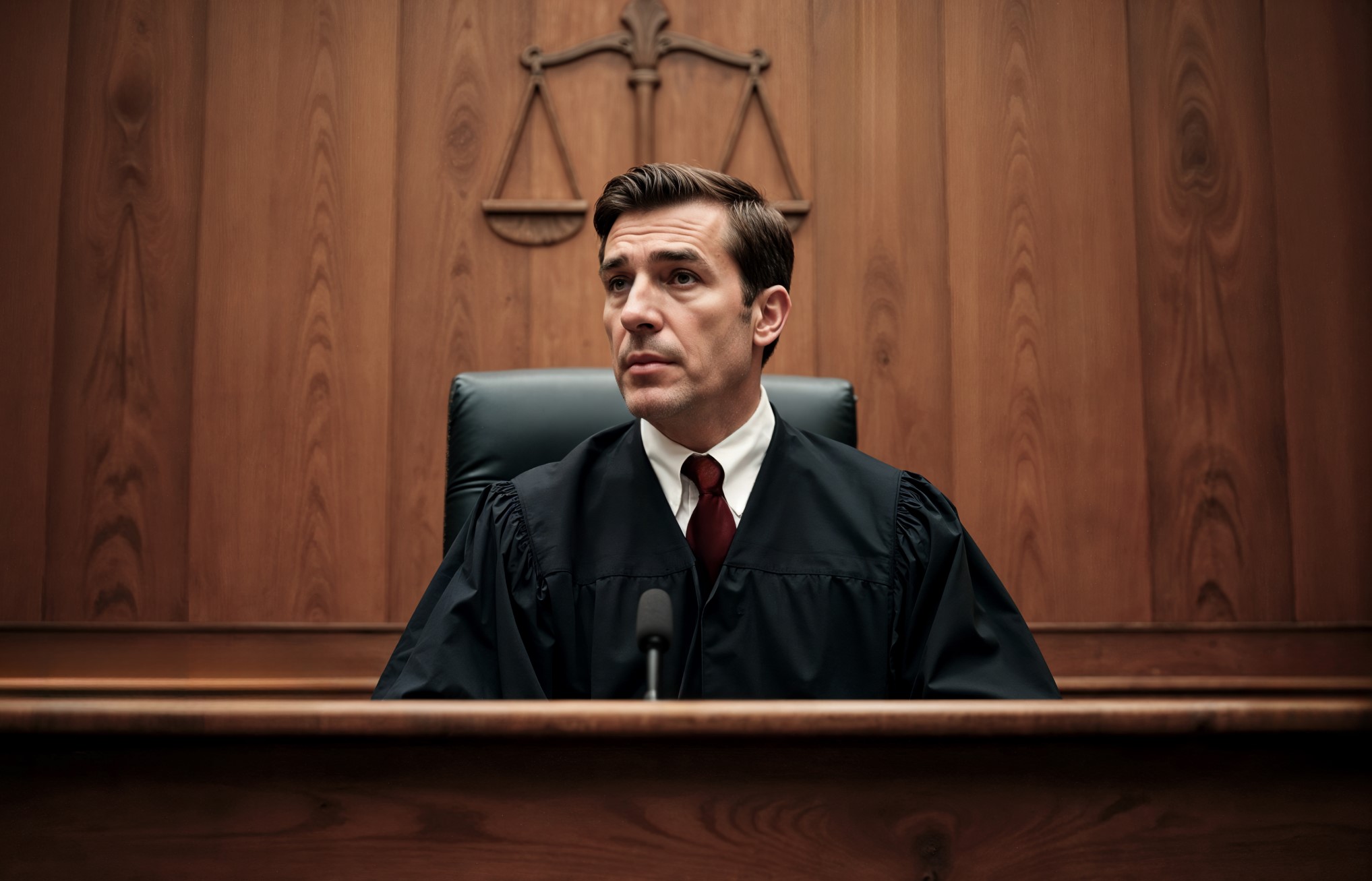The Letter That Changed Everything: A Mother’s Fight for Justice
The fluorescent lights in the county courthouse cast harsh shadows across the worn linoleum floor as I walked through the metal detectors for what I hoped would be the last time. My name is Sarah Maro, and at thirty-four years old, I was fighting the most important battle of my life—a custody hearing that would determine whether my children, seven-year-old Luca and five-year-old Arya, would remain with me or be handed over to a man who had systematically destroyed our family through manipulation and financial abuse.
I clutched a manila folder containing what little documentation I had been able to gather: school records showing my children’s consistent attendance, a letter from our landlord confirming that despite our modest circumstances, I had never missed a rent payment, and medical records proving that both children were healthy and well-cared for despite our financial struggles. It wasn’t much compared to the arsenal of professional presentations and financial statements that my ex-husband Derek would undoubtedly bring to court, but it represented everything I had to offer in defense of our family.
The borrowed dress I wore was navy blue with small flowers, something I had found at a thrift store and had altered to fit properly. It was clean and pressed, though the fabric was thin from years of washing, and I had paired it with a blazer that my neighbor had lent me specifically for this occasion. My shoes were black flats that I had polished until they looked almost new, and I had spent the previous evening practicing how to sit, stand, and speak in ways that would project competence and stability rather than the financial desperation that had characterized my life since Derek left.
The past eighteen months had been a masterclass in survival, though I wouldn’t have chosen to learn those lessons. When Derek announced that he was leaving our marriage for a younger colleague and simultaneously cut off access to all joint financial accounts, I had been thrust into a world I was utterly unprepared to navigate. For eight years of marriage, I had been encouraged—required, really—to focus exclusively on homemaking and child-rearing while Derek handled all financial decisions and professional responsibilities.
“You don’t need to worry about money,” he had told me repeatedly throughout our marriage. “Your job is to take care of the children and create a beautiful home for our family. I’ll handle everything else.”
What I hadn’t understood was that this arrangement left me completely vulnerable when the marriage ended. With no recent work experience, no professional references, no credit in my own name, and no savings that Derek couldn’t access, I had found myself essentially starting life over at thirty-two with two young children who depended on me for everything.
The apartment we now called home was a two-bedroom unit in a complex that had seen better days, but it was clean and safe, and most importantly, it was ours. The rent consumed nearly sixty percent of my income from two part-time cleaning jobs that I had found through word-of-mouth referrals, but we had managed to stay current on all our bills through careful budgeting and the kind of creative resource management that you learn when failure isn’t an option.
Our furniture was a mixture of donations from church members, items found on neighborhood social media groups, and pieces rescued from garage sales on Sunday afternoons when everything was marked down to clear. The children’s beds were sturdy and comfortable, assembled from instructions I had figured out myself using tools borrowed from our downstairs neighbor. Their clothes came primarily from consignment shops and clothing swaps organized by other single mothers, but they were always clean and appropriate for school and play.
We didn’t have cable television or internet service, but the public library provided both entertainment and educational resources that filled our evenings with stories and learning opportunities. I had taught both children to see these limitations as adventures rather than deprivations—library visits became treasure hunts for new books, cooking simple meals became opportunities to learn about nutrition and budgeting, and walking instead of driving became chances to explore our neighborhood and get exercise together.
But despite my efforts to frame our circumstances positively, I was acutely aware that our lifestyle would be viewed through a harsh lens in family court. Derek’s attorney would undoubtedly present evidence of our financial struggles as proof that I was unable to provide adequately for our children, and the visual contrast between Derek’s comfortable suburban home and our modest apartment would speak louder than any testimony about my love and dedication as a mother.
Derek had retained Carlaine Mitchell, a family law attorney whose reputation for aggressive tactics and courtroom theatrics was well-known throughout the county. She specialized in high-conflict custody cases and had built her practice on the principle that financial resources and professional presentation could overcome almost any opposing argument. Her fees alone exceeded my annual income, but Derek’s consulting business provided the kind of steady revenue that made such expenses manageable rather than catastrophic.
I, meanwhile, had been forced to represent myself after exhausting the limited resources available through legal aid organizations. The free legal clinic at the courthouse had provided basic guidance about filing procedures and courtroom etiquette, but I would be facing Derek’s legal team without professional representation or the kind of strategic preparation that could level the playing field.
The night before the hearing, I had lain awake reviewing every possible argument Derek might make against my fitness as a parent. He would point to our small apartment, our limited food budget, the secondhand clothes my children wore to school. He would argue that his financial stability and suburban home represented a better environment for Luca and Arya’s development and future opportunities.
What he wouldn’t mention was the way he had systematically isolated me from friends and extended family during our marriage, discouraging relationships that might have provided emotional or practical support during the divorce. He wouldn’t discuss the emotional distance he had maintained from our children, treating them more like household accessories than individuals whose thoughts and feelings mattered. And he certainly wouldn’t acknowledge the strategic nature of his financial maneuvering, which had left me destitute while preserving his own lifestyle and legal options.
As I waited outside the courtroom that morning, I tried to project the kind of calm confidence that would serve my children’s interests, but internally I was terrified. Everything I cared about in the world depended on convincing a judge that love, stability, and dedication could outweigh financial disadvantage in determining what was best for Luca and Arya.
When the bailiff called our case, I stood up on legs that felt unsteady and followed my children into the courtroom where our future would be decided. Luca held my hand tightly as we walked down the aisle, while Arya pressed close to my other side, both of them sensing the gravity of the situation even if they didn’t fully understand the legal proceedings that were about to unfold.
Judge Harold Brennan presided over our case with the kind of weathered authority that comes from decades of family court experience. He was known for being fair but practical, someone who focused on concrete evidence rather than emotional appeals when making decisions that would affect children’s lives. His reputation suggested that he would be neither swayed by Derek’s financial advantages nor sympathetic to my circumstances unless I could present compelling reasons why custody should remain with me.
Derek sat at the plaintiff’s table wearing a perfectly tailored charcoal suit, his posture reflecting the confidence of someone who had never doubted that money and influence would produce favorable outcomes. He avoided eye contact with me and the children, focusing instead on whispered conversations with his attorney and the organization of documents that would support his case for custody modification.
Carlaine Mitchell rose to present Derek’s opening argument with the practiced eloquence of someone who had delivered similar presentations dozens of times. She painted a picture of a successful businessman who could provide material advantages and educational opportunities that I simply couldn’t match, while characterizing my financial struggles as evidence of instability and poor judgment rather than the predictable result of Derek’s strategic abandonment.
“Your Honor,” she began, her voice carrying clearly through the courtroom, “my client seeks custody modification based on significant changes in circumstances that affect the children’s welfare and future prospects. Since the divorce, the mother has been unable to provide stable housing, adequate nutrition, or basic material necessities that growing children require.”
She gestured toward a presentation board displaying photographs of Derek’s suburban home with its manicured lawn, spacious bedrooms, and modern amenities. “Mr. Maro has maintained a stable residence in an excellent school district, with dedicated spaces for homework and recreation, access to extracurricular activities, and the financial resources necessary to support college preparation and other long-term educational goals.”
Then she turned her attention to our living situation, and I felt my stomach clench as she described our modest circumstances in terms designed to emphasize inadequacy rather than resilience.
“The children currently live in a two-bedroom apartment in a complex with documented safety concerns, where they share limited space and resources that reflect their mother’s inability to provide appropriate living conditions. School records indicate that Luca occasionally arrives wearing shoes with visible wear and Arya sometimes appears tired in morning classes, suggesting inadequate rest due to housing instability.”
Each accusation felt like a physical blow, though I forced myself to remain outwardly composed while internally cataloging responses to her characterizations. Yes, Luca’s shoes showed wear because children are active and I couldn’t afford to replace them frequently, but they were clean and functional. Yes, Arya sometimes seemed tired because she was five years old and still adjusting to full-day kindergarten, not because our home environment was somehow deficient.
“Your Honor,” Carlaine continued, building toward her conclusion, “while no one questions Ms. Maro’s love for her children, love alone cannot provide the educational opportunities, healthcare access, and material stability that these children deserve. Mr. Maro is prepared to offer both emotional support and practical resources that will serve the children’s best interests as they grow and develop.”
When she finished her opening statement, I felt as though the air had been slowly squeezed from my lungs. Every word had been carefully chosen to reinforce the narrative that financial resources equated to superior parenting, while my efforts to provide stability and care despite limited means were dismissed as insufficient.
Judge Brennan called for my response, and I stood on unsteady legs to present the case for maintaining custody with me. My voice sounded smaller than I had hoped as I began to speak about the daily reality of our lives and the bonds that held our small family together.
“Your Honor, I understand that Mr. Maro can offer material advantages that I cannot provide. But I want the court to understand what I can offer, and what has been consistent in our children’s lives since this difficult transition began.”
I opened my folder and pulled out documentation of school attendance, medical records, and testimonials from teachers and neighbors who had observed my parenting firsthand.
“Luca and Arya have maintained perfect school attendance throughout this transition. Their teachers describe them as well-adjusted, kind children who demonstrate strong emotional intelligence and resilience. Their pediatrician confirms that they are healthy, up-to-date on all vaccinations, and show no signs of neglect or inadequate care.”
I paused, trying to find words that would convey the depth of my commitment without sounding defensive or desperate.
“I may not be able to provide a large house or expensive clothes, but I have been present for every important moment in my children’s lives. I know Luca’s favorite book series and how he likes his sandwich cut for lunch. I know that Arya talks in her sleep and has nightmares if she watches movies that are too exciting before bedtime. I know their friends’ names, their teachers’ concerns, their hopes and fears and dreams.”
But even as I spoke, I could see the judge’s expression remaining neutral, professional, focused on the legal and practical considerations that would determine his decision rather than the emotional bonds I was trying to articulate.
Carlaine’s cross-examination was brutal in its efficiency. She asked pointed questions about our budget, our living arrangements, our long-term financial planning, each query designed to highlight the instability and uncertainty that characterized our current circumstances.
“Ms. Maro, how do you plan to pay for Luca’s orthodontic treatment when the time comes?”
“I would find a way to manage it, just as I’ve managed everything else.”
“How specifically? Do you have savings set aside for medical expenses?”
“No, but I would work with the orthodontist on a payment plan, or seek assistance through community health programs.”
“And if those options aren’t available?”
“I would find another solution. I always do.”
Her questions continued in this vein, each one exposing another area where my financial limitations might affect my children’s future opportunities. By the time she finished, I felt as though I had been systematically dismantled, reduced to a list of inadequacies and uncertainties that made Derek’s stability appear even more attractive by comparison.
Judge Brennan appeared to be considering the evidence presented by both sides, and his expression suggested that Carlaine’s arguments about financial stability and material advantages were resonating more strongly than my appeals to emotional bonds and day-to-day caregiving.
“Ms. Maro,” he said finally, “while the court recognizes your dedication to your children, the evidence suggests that Mr. Maro is better positioned to provide for their long-term needs and development. Unless there are additional factors that the court should consider, I am inclined to modify the custody arrangement to reflect the children’s best interests.”
I felt the world tilting around me as I processed what he was saying. Despite everything I had sacrificed, despite the love and stability I had provided under impossible circumstances, the simple fact of Derek’s financial advantage was going to determine where my children would live and how they would be raised.
That was the moment when Luca stood up.
My seven-year-old son, who had been sitting quietly throughout the proceedings, rose from his seat and looked directly at Judge Brennan with the kind of serious expression that seemed far beyond his years.
“Your Honor,” he said, his young voice carrying clearly through the suddenly silent courtroom, “may I show you something important?”
The judge looked surprised but intrigued. “What would you like to show me, son?”
Luca reached into the small backpack he had been carrying and withdrew a folded piece of paper that I had never seen before. “I found this letter in my dad’s safe when I was looking for my tablet at his house. I think it might be important for you to see.”
Derek’s face went white as Luca walked toward the judge’s bench with the document in his small hand. Carlaine started to object, but Judge Brennan held up his hand to stop her.
“Let me see what the young man has found,” he said, accepting the paper from Luca and unfolding it carefully.
As Judge Brennan began to read, his expression changed from mild curiosity to serious concern to barely controlled anger. The silence in the courtroom was absolute as everyone waited to understand what Luca had discovered.
“Would you like to explain this, Mr. Maro?” Judge Brennan asked finally, his voice carrying a tone that made Derek shrink back in his chair.
When Derek didn’t respond immediately, the judge began reading portions of the document aloud.
“This appears to be correspondence between Mr. Maro and his financial advisor, dated three months before the divorce filing was initiated. It outlines a comprehensive strategy for concealing assets, minimizing reported income, and creating the appearance of financial stability while ensuring that Mrs. Maro would have limited resources for legal representation.”
He paused, looking directly at Derek with unconcealed displeasure.
“The document specifically recommends ‘maintaining primary custody to minimize support obligations’ and ‘ensuring that the opposing party appears financially unstable in court proceedings.’ Mr. Maro, this suggests that your custody petition is motivated by financial manipulation rather than concern for your children’s welfare.”
Derek finally found his voice, though it sounded strained and uncertain. “Your Honor, that document represents preliminary discussions that were never implemented. It doesn’t reflect any actual actions taken during the divorce proceedings.”
“On the contrary,” Judge Brennan replied, consulting additional pages of the document, “this appears to outline exactly the circumstances we see before us today. Mrs. Maro’s financial difficulties, which your attorney has presented as evidence of her unfitness, appear to be the direct result of deliberate actions designed to leave her without resources or legal representation.”
He turned his attention to Carlaine, whose composed professional demeanor had been replaced by obvious discomfort.
“Ms. Mitchell, were you aware of this financial strategy when you prepared your client’s custody petition?”
“No, Your Honor. This is the first time I’m seeing this document.”
“Then I suggest you review your client intake procedures, because this court does not appreciate being used to legitimize what appears to be deliberate financial abuse.”
Judge Brennan set the document down and looked at Luca, who had returned to his seat beside me but was watching the proceedings with the intense focus of someone who understood that important decisions were being made.
“Young man, where exactly did you find this letter?”
“In Dad’s home office,” Luca replied. “He has a safe where he keeps important papers. The door was open when I was looking for my tablet, and I saw this with my name and Arya’s name on it. I thought it might be important.”
“You were absolutely right,” Judge Brennan said. “You’ve provided information that significantly changes how this court views these proceedings.”
Over the next thirty minutes, Judge Brennan ordered a recess to allow time for additional investigation into the financial documentation Derek had provided to the court. When proceedings resumed, it became clear that Derek’s apparent stability was built on a foundation of hidden assets and manipulated income reporting that painted a false picture of both his circumstances and mine.
“Mr. Maro,” Judge Brennan said when court reconvened, “the investigation into your financial disclosures has revealed significant inconsistencies that suggest deliberate misrepresentation to this court. Not only will I be denying your petition for custody modification, but I am also ordering a complete financial audit to determine appropriate child support obligations based on your actual income and assets.”
He turned to address me directly, his tone becoming warmer and more respectful than it had been during the initial proceedings.
“Ms. Maro, while the court recognizes that your current financial situation presents challenges, the evidence now suggests that these challenges are the result of deliberate sabotage rather than personal inadequacy. Your children appear to be thriving under your care despite difficult circumstances, and this court sees no reason to disrupt their stability by removing them from your custody.”
The relief that washed over me was so intense that I had to grip the edge of the table to keep from collapsing. Luca reached over and squeezed my hand, while Arya, who had been quietly coloring during most of the proceedings, looked up and smiled as if she had always known everything would work out fine.
Derek left the courtroom without speaking to any of us, his confident bearing replaced by the posture of someone who had been caught in a web of his own making. Carlaine gathered her materials efficiently, avoiding eye contact with me as she prepared to deal with the professional ramifications of having unknowingly participated in court fraud.
The months that followed brought changes I could never have anticipated when I was struggling to survive on cleaning jobs and thrift store clothing. The financial audit revealed that Derek had been concealing substantial assets and income, resulting in child support payments that allowed me to move to a better apartment, return to school part-time, and provide the kind of stability for Luca and Arya that I had always wanted to offer.
More importantly, the truth about Derek’s manipulation strategies freed me from the shame and self-doubt that had characterized my life since the divorce. I had not failed as a mother or a provider—I had been systematically undermined by someone who viewed our children as financial pawns rather than human beings deserving of love and protection.
Luca’s decision to share the letter he had found demonstrated a wisdom and courage that still amazes me. At seven years old, he had understood that the document contained information relevant to our family’s future, and he had chosen to reveal it despite the potential consequences for his relationship with his father.
When I asked him later why he had decided to speak up in court, his answer was simple: “I didn’t want us to be separated. And I knew Dad was being mean to you.”
The intelligence and moral clarity he displayed that day reminded me that children often understand family dynamics more clearly than adults give them credit for, and that protecting them sometimes means allowing them to speak their own truth rather than shielding them from difficult realities.
Two years have passed since that day in court, and our life has stabilized in ways I never dared to hope for during the darkest period after Derek left. I completed a certification program in accounting and now work for a nonprofit organization that provides financial literacy education to families in transition. The job provides health insurance, paid vacation time, and the kind of professional satisfaction that comes from helping other people navigate challenges similar to those I faced.
Luca and Arya have thrived in the stability that came with our improved circumstances, but more importantly, they have grown up understanding that families are built on honesty, mutual support, and the willingness to stand up for what is right even when it’s difficult.
The letter that changed everything sits framed in my home office now, not as a reminder of Derek’s betrayal but as a symbol of truth’s power to overcome deception and of the courage that even young people can display when they understand what matters most.
Sometimes justice comes through dramatic courtroom revelations and legal vindication, but more often it arrives through the daily choices we make to protect and nurture the people we love, regardless of the obstacles we face. Luca taught me that day that truth-telling is an act of love, and that even when we feel powerless, we all have the ability to change the world in small but significant ways.
The story that began with financial manipulation and legal intimidation ended with family bonds made stronger by shared struggle and the recognition that real wealth lies not in bank accounts or material possessions, but in the unshakeable knowledge that we will always show up for each other when it matters most.

Emily Johnson is a critically acclaimed essayist and novelist known for her thought-provoking works centered on feminism, women’s rights, and modern relationships. Born and raised in Portland, Oregon, Emily grew up with a deep love of books, often spending her afternoons at her local library. She went on to study literature and gender studies at UCLA, where she became deeply involved in activism and began publishing essays in campus journals. Her debut essay collection, Voices Unbound, struck a chord with readers nationwide for its fearless exploration of gender dynamics, identity, and the challenges faced by women in contemporary society. Emily later transitioned into fiction, writing novels that balance compelling storytelling with social commentary. Her protagonists are often strong, multidimensional women navigating love, ambition, and the struggles of everyday life, making her a favorite among readers who crave authentic, relatable narratives. Critics praise her ability to merge personal intimacy with universal themes. Off the page, Emily is an advocate for women in publishing, leading workshops that encourage young female writers to embrace their voices. She lives in Seattle with her partner and two rescue cats, where she continues to write, teach, and inspire a new generation of storytellers.









